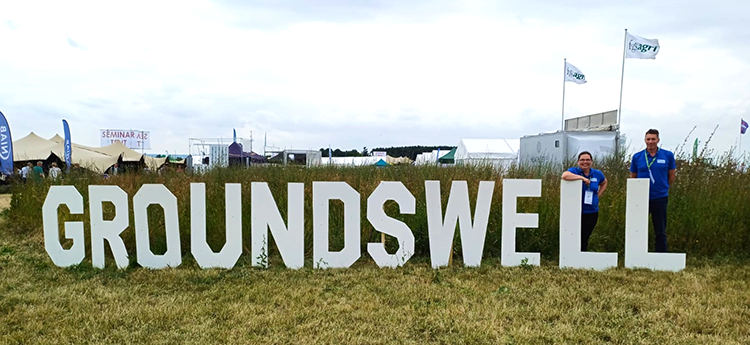Olivia Nelson
We were very pleased to have the opportunity to speak about floodplain meadows at Groundswell – a two day affair in July which styles itself as a regenerative agricultural festival providing opportunities for farmers, growers, or anyone interested in food production and the environment to learn about the theory and practical applications of regenerative farming systems. I would class it as the summer outing for all those who are interested in, and go to, the Oxford Real Farming Conference - albeit with a bit more of a Country Agricultural Fair feel to it.
Whilst I chaired the session the speakers included two members of the FMP team – Professor David Gowing and Dr Clare Lawson as well as Chris Short, Associate Professor In Environmental Governance in the Countryside & Community Research Institute from the University of Gloucestershire , and Andy Rumming, an FMP stalwart whose family has been farming cattle on a key floodplain meadow, North Meadow, for over 60 years. The session focused on the role of species rich floodplain grasslands as a prime example of a nature-based solution that can deliver a range of eco-services, whilst remaining a sustainable and productive agricultural crop. The intention was to show the potential for floodplains within the present context where there has been a significant decline in species rich grasslands generally - especially so with floodplains.
David provided practical advice on the farming practices and restoration techniques required to allow species-rich wet grasslands to thrive. He also outlined the work of the Floodplain Meadows Partnership in undertaking long term monitoring to improve knowledge about plant community responses to environmental change and how we disseminate this information to all those involved in the conservation, management and restoration of floodplain meadows. The Natural Capital of floodplain meadows was discussed by Clare who focused on FMP research into soil carbon, highlighting results from working with farmers including our Fertilise the Future and Flourishing Floodplains projects. Chris was the co-lead on the project developing farmer-friendly outputs relating to the management of floodplains as part of the Flourishing Floodplains initiative. He provided key findings from interviews with farmers regarding what policy is needed to better support flourishing floodplains alongside the case studies developed by the University of Gloucestershire. Finally, Andy spoke about his own experience on the practicalities of integrating floodplain meadows into the heart of his agricultural business.
It seemed very well received with about 150 people attending the session (not bad for a late afternoon slot!) garnering questions and requests for advice both during the presentation and afterwards. Questions raised considered suitable fencing in the face of flooding, how long it takes to restore meadows, cutting/ grazing regimes and nutrient neutrality. There also seemed to be a small surge of interested folk coming to talk to us at the end! We were even told by a couple of attendees that it was probably one of the most useful sessions of Groundswell. Since then we have already had a couple of farmers get in touch with us and we would certainly welcome more. It feels that there is an enthusiasm and recognition of the potential for floodplain meadows as part of a sustainable productive agricultural business – one the FMP will look to encourage practically as well as through the policy and funding support needed for thriving resilient nature-rich floodplains.
If you missed it - there is a recording of the session on YouTube at Floodplain Meadows – Beauty & Utility - Groundswell 2023 - YouTube
I would also encourage you to come along to Groundswell next year if you haven’t previously attended. It was a great atmosphere, one full of passionate, committed intelligent debate and discussion on the future of agricultural which can tackle the climate and biodiversity crisis. There were discussions covering everything from achieving Net Zero, hedgerows and heritage crops, to farmers working with sustainable fashion industry, which seems to be attracting attention from Government and influential stakeholders including NGOs and universities. There is also, as you might imagine, excellent sustainable catering which I certainly enjoyed! We hope to be back next year.
